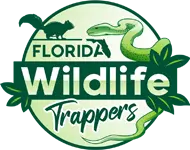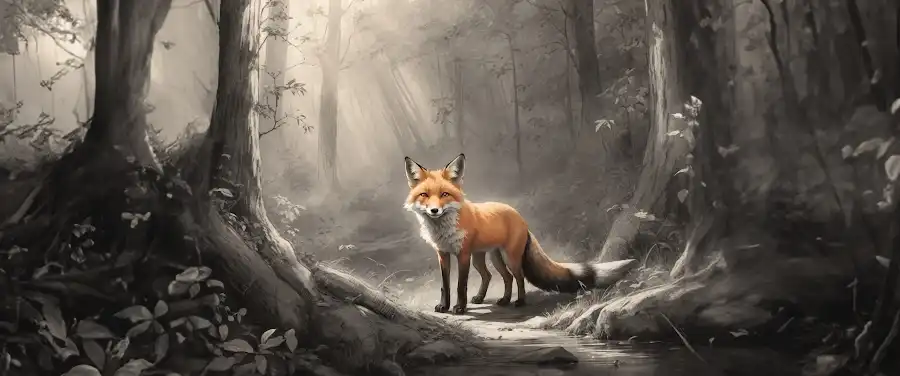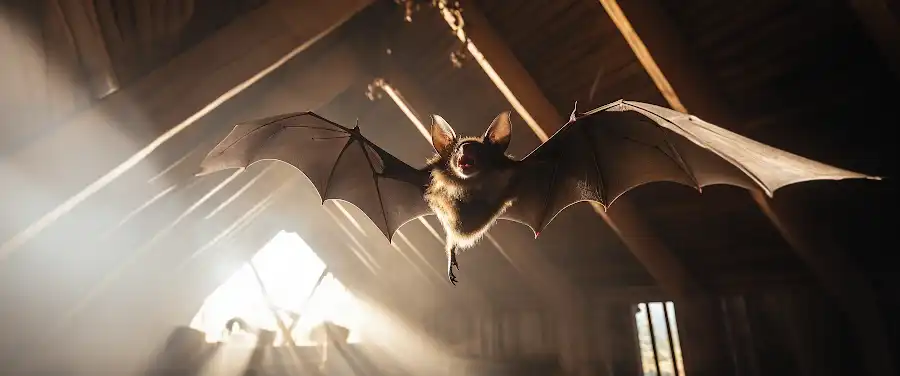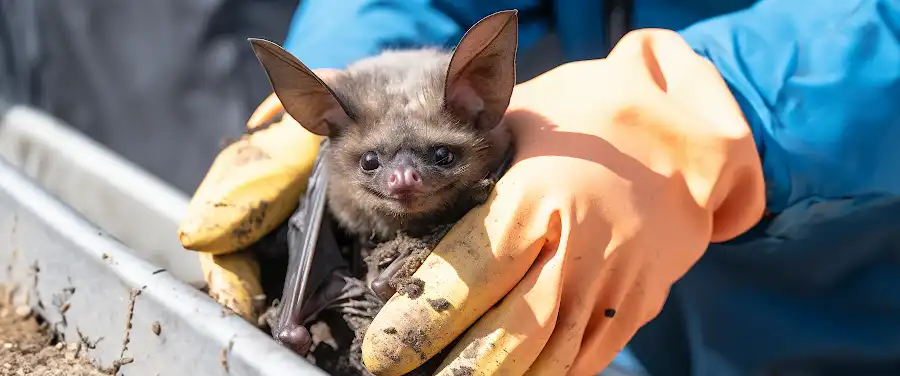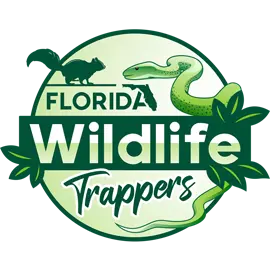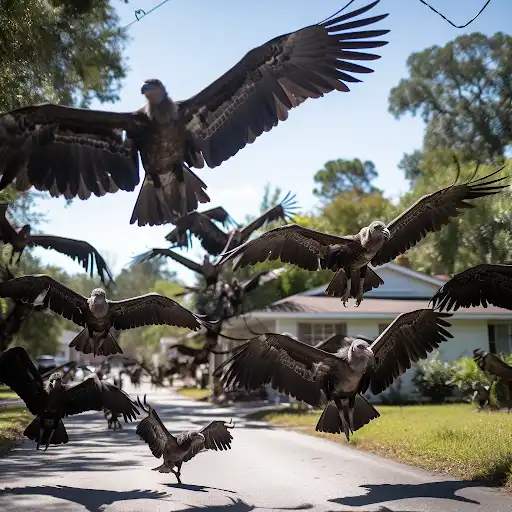
Have you ever wondered at the sight of large, majestic birds, soaring effortlessly in the mid-afternoon skies? The ones interrupted sporadically by their signature shallow wingbeats? Well, these could most likely be Turkey Vultures – Florida’s own residents who have called these wide-open skies home for centuries. Like their name suggests, they’re virtually walking turkeys with the not-so-pleasant job of cleaning up our environment’s mess. But, recently, these silent, soaring janitors have morphed into unwelcomed invaders in their home turf, Central Florida, causing various problems that can’t be ignored.
Now, you might be asking, “Why should I care?” Well, the issue isn’t as far removed from your sunny retreats and lazy afternoons as you might think. These birds, classified as scavengers, have been showing some bizarre and rather concerning behavior, enough to send jolts of alarm through quiet, peaceable neighborhoods. They’ve gone from being inconspicuous inhabitants to headline-grabbing nuisances, disrupting the tranquility for Central Florida residents. Their strange behavior and resolute attendance in suburban areas has raised eyebrows and dropped jaws, causing an undercurrent of concern to ripple across the state.
Their unpleasant conduct and unsightly appearance are far from their only sins. Central Florida’s Turkey Vulture problem is a multifaceted issue with severe implications. From causing damage to property, threatening local pets, to leaving behind a trail of destruction…these birds of flight might not be so flighty after all. Unfortunately, these relentless scavengers, seemingly comfortable in the urban environment, show no signs of leaving anytime soon. Why are Turkey Vultures becoming a menace in Central Florida? Stick around to unravel this unexpected predicament and learn more about the impact it’s having on the community!
What Are The Impacts Of Turkey Vultures On Local Communities?
The arrival of Turkey Vultures in Central Florida has caused an uproar among residents. They come in droves, roosting in trees and on rooftops, leaving a trail of chaos in their wake. Homeowners are grappling with the vultures’ invasive tendencies and the problems they are causing to local communities.
Damage to Property
First off, this predatory bird species is responsible for significant damage to properties. Their robust beaks and strong feet can easily peck and tear at roof materials, causing substantial damage over time. Moreover, their acidic excrement corrodes cars and buildings, leading to expensive repairs. Homeowners have even reported instances where these winged marauders have torn off window seals and roof shingles!
Threat to Livestock
Beyond property damage, Turkey Vultures are a considerable threat to livestock. Despite being primarily scavengers, they are known to attack small animals, particularly during breeding season when their food requirements increase. Pets like cats and dogs, and small farm animals, are particularly at risk.
Health Risks
Turkey Vultures pose significant health risks to local residents. Their droppings are a potential source of harmful bacteria and fungi, causing diseases like histoplasmosis, a serious lung disease. Additionally, the large amounts of excrement left behind by the vultures can contaminate local water sources, leading to further health complications.
Economic Impact
The frequent sightings and predatory behavior of Turkey Vultures in Central Florida have serious implications for the local economy. Property damage repairs can be costly for homeowners, and the threat to livestock can quickly become a financial burden for small farmers. Several local businesses have reported declining foot traffic due to the vulture problem, impacting local revenues.
According to Audubon Florida, there’s been an astounding 15% increase in vulture populations over the past decade, causing increasing challenges in areas newly colonized by these birds and putting communities at financial risk.
In conclusion, Turkey Vultures are – quite literally – leaving a mark on Central Florida. Their destructive behaviour and the health risks they pose are the bane of local communities. Unfortunately, tackling the problem is not straightforward because these birds are protected by the Migratory Bird Treaty Act, meaning that people can’t harm or initiate action against them without permits.
Now that we’ve touched on the impacts of Turkey Vultures on local communities, let’s talk about the environmental concerns related to their increasing population in the next section.
What Are The Environmental Concerns Associated With The Increasing Turkey Vulture Population?
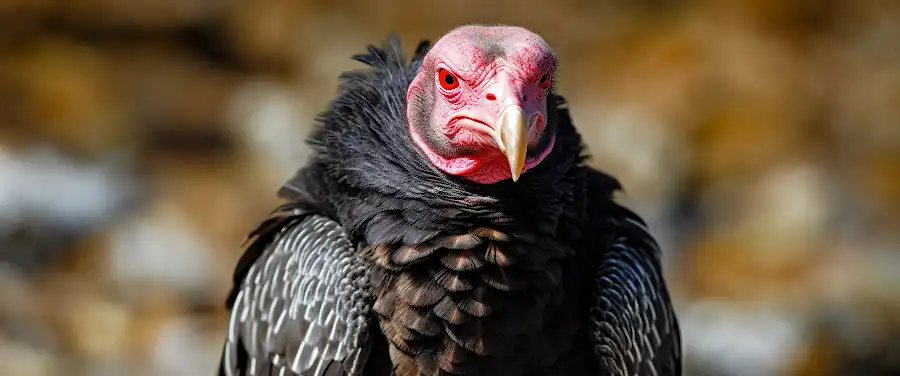
While scavengers like turkey vultures play a significant part in reducing the spread of diseases by eliminating dead animals, they can also transmit dangerous diseases. An overpopulation of these vultures increases the likelihood of disease transmission to other wildlife, and potentially, to humans.
According to the U.S. Centers for Disease Control and Prevention, vultures can carry and spread diseases such as histoplasmosis, a potentially serious infection acquired by inhaling the spores of a fungus found in bird droppings.
The Ecological Impact of Turkey Vultures
Turkey vultures serve as nature’s clean-up crew, eating carrion, or dead animals. This ecological role, however, can turn detrimental in large numbers. Instead of just feasting on naturally occurring carcasses, they might kill weak or young animals, causing imbalance in the food chain.
Potential Impact on Other Wildlife
An excessive population of turkey vultures can create competition for food and roosting spots with other scavenger species, such as other vultures or eagles. These frictions have the potential to disrupt harmony within diverse ecosystems and lead to a decline in other wildlife species.
Disease Transmission Risks
Imagine finding your stylish clothing, treasured books, and other household items shredded to bits. Rodents are not picky about what they gnaw on, resulting in personal property damage. Further, they often venture into food supplies, contaminating them and leading to further losses. Destruction and contamination by rodents turn your beloved household items into chew toys and cause the loss of useable supplies, exacerbating the economic impact of an infestation.
To give you an idea of the average costs and types of damage associated with rodent infestations, have a look at the following table:
Adverse Effect on Waste Management
Finally, with their sharp beaks and powerful stomach acid, turkey vultures can eat just about anything. Their overpopulation can lead to problems in waste management as they rummage through trash and strew waste across the neighborhoods.
In conclusion, while turkey vultures do play a vital role in our ecosystem, their burgeoning numbers in Central Florida pose complex challenges. Understanding these concerns is the first step towards finding sustainable solutions in dealing with these creatures.
How Are Local Authorities Dealing With The Vulture Problem?
Alright there, friend! We’ve just come to the end of this journey into the intriguing world of Turkey Vultures in Central Florida. Now, while most folks might shy away from the sight of these unintentional neighborhood lurkers, we just spent a chunk of time learning about them. From understanding the problems they pose to residents to ways in which their population can be managed, we’ve navigated some rough waters.
Indeed, it’s more than clear just how much of a bother these birds have become, isn’t it? Their sheer numbers, combined with habits that aren’t exactly city-friendly, can turn living in paradise into a right headache. These birds aren’t exactly the best neighbors, causing damage to properties, defacing rooftops, and causing an unholy racket with their large roosts.
But remember, this issue isn’t just a simple pest problem that can be swatted away. Coping with these vultures requires effort and understanding on several fronts. That includes not just local residents, but also city officials and wildlife researchers. Unity within community equals a less squeaky wheel, right?
There’s so much more to learn about Turkey Vultures in Central Florida that it almost feels like we’re just scratching the surface. It’s a challenge for sure, but also an opportunity for us to conjure up solutions that balance human needs and wildlife conservation. It’s high time we looked these issues straight in the eye, and came up with ways to allow humans and vultures coexist harmoniously.
So, folks, let’s all roll up our sleeves and get on this. It’s up to us to bring about the change we want, not just for the vulture management but for our own peace of mind. The more we learn, the more we understand and appreciate the balance of our local ecosystems.
In short, Turkey Vultures in Central Florida aren’t just a problem. They could also be a catalyst for our communities to come together in a common cause and shape our neighborhoods for the better. So, let’s embrace the need for further research and community involvement. We’ve got this, friends!
REMEMBER: When we know more, we fear less. Let’s turn the vulture problem into our victory!
